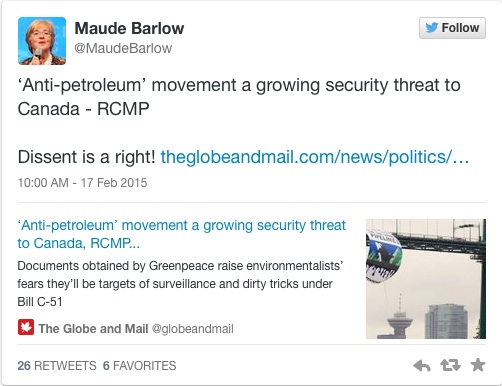Chip in to keep stories like these coming.
In response to the news about an RCMP document obtained by Greenpeace Canada, Council of Canadians chairperson Maude Barlow has tweeted: “Dissent is a right!”
She and many others are worried because the Globe and Mail reports, “The RCMP has labelled the ‘anti-petroleum’ movement as a growing and violent threat to Canada’s security, raising fears among environmentalists that they face increased surveillance, and possibly worse, under the Harper government’s new terrorism legislation.”

RCMP view reflects Harper government’s hostility
“In highly charged language that reflects the government’s hostility toward environmental activists, an RCMP intelligence assessment warns that foreign-funded groups are bent on blocking oil sands expansion and pipeline construction, and that the extremists in the movement are willing to resort to violence. …The report extolls the value of the oil and gas sector to the Canadian economy, and adds that many environmentalists ‘claim’ that climate change is the most serious global environmental threat, and ‘claim’ it is a direct consequence of human activity and is ‘reportedly’ linked to the use of fossil fuels.”
In January 2012, then-Natural Resources minister Joe Oliver stated, “Unfortunately, there are environmental and other radical groups that would seek to block this opportunity [the Northern Gateway pipeline] to diversify our trade. …Their goal is to stop any major project no matter what the cost to Canadian families in lost jobs and economic growth. No forestry. No mining. No oil. No gas. No more hydro-electric dams. …[They] threaten to hijack our regulatory system to achieve their radical ideological agenda.”
Oliver, who is now Harper’s finance minister, also criticized groups for receiving funding from “foreign special interest groups to undermine Canada’s national economic interest.” In that regard, it’s notable that right-wing commentator Ezra Levant has picked up on this too. In October 2014, he wrote in the Toronto Sun, “Even the Council of Canadians has sold out, taking more than $1.6 million in U.S. funds. Not surprisingly, all are paid to attack our oil and gas industry. (The Council of Canadians has said the foreign money was used for an international UN water project.) I say, let’s fight back.”
C-51 and C-639 prompt concern
“The government has tabled Bill C-51, which provides greater power to the security agencies to collect information on and disrupt the activities of suspected terrorist groups. While Prime Minister Stephen Harper has identified the threat as violent extremists motivated by radical Islamic views, the legislation would also expand the ability of government agencies to infiltrate environmental groups on the suspicion that they are promoting civil disobedience or other criminal acts to oppose resource projects.”
In early-February, the Globe and Mail warned, “Bill C-51 creates new powers for CSIS to stop any ‘activity’ that ‘undermines the sovereignty, security or territorial integrity of Canada.’ A subsequent list of such activities includes ‘terrorism,’ ‘interference with critical infrastructure’ and ‘interference with the capability of the Government in relation to … the economic or financial stability of Canada.'” They then ask who could C-51 be applied against, “First Nations activists who disrupt a train line? Environmental activists denounced as radicals by a cabinet minister? These things are on a par with terrorism now?”
The Harper government’s Bill C-639 should also be noted here. This federal private member’s bill introduced by Conservative MP Wai Young, and supported by justice minister Peter MacKay, makes it a Criminal Code offence to “obstruct, interrupt or interfere” with critical infrastructure. Individuals could face prison sentences of two to ten years and fines up to $3,000. The MP who introduced this legislation represents the riding next to Burnaby Mountain where the community tried to block Kinder Morgan from drilling bore holes in a public park for the expansion of the Trans Mountain tar sands pipeline.
Monitoring and reporting to industry already happening
“The British Columbia Civil Liberties Association has already launched challenges to the RCMP complaints commission and the Security Intelligence Review Committee — which oversees the Canadian Security Intelligence Service — over alleged surveillance of groups opposed to the construction of the proposed Northern Gateway pipeline in B.C.”
In September 2014, the Canadian Press reported, “The association filed the complaint with the review committee in February after media reports suggested that CSIS and other government agencies consider protests and opposition to the petroleum industry as possible threats to national security. The complaint also cited reports that CSIS had worked with and shared information with the National Energy Board about so-called ‘radicalized environmentalist’ groups seeking to participate in the board’s hearings on Enbridge’s Northern Gateway pipeline project… The groups included Leadnow, ForestEthics Advocacy Association, the Council of Canadians, the Dogwood Initiative, EcoSociety, the Sierra Club of British Columbia.”
And in November 2011, CBC reported that an RCMP-led intelligence team had spied on community organizations and activists and then “made a series of presentations to private-sector corporations, including one to ‘energy sector stakeholders’ in November 2011. Other corporations that received intelligence from police included Canada’s major banks, telecom firms, airlines, downtown property companies and other businesses seen to be vulnerable to the effects of [G20] summit protests.”
This is not the first time the RCMP has made such an assessment. In late 2014, the Globe and Mail also reported that the RCMP’s critical infrastructure intelligence team had written, “Environmental ideologically motivated individuals including some who are aligned with a radical, criminal extremist ideology pose a clear and present criminal threat to Canada’s energy sector. …The Canadian law enforcement and security intelligence community have noted a growing radicalized faction of environmentalists who advocate the use of criminal activity to promote the protection of the natural environment.”
The Council of Canadians is concerned by this level of politicized policing and asserts that the unconstrained expansion of the tar sands, the dangerously increasing levels of greenhouse gas emissions into the atmosphere, the ongoing destruction of finite water resources necessary for both people and nature, and the scientific certainty of catastrophic climate change if policies to limit this damage and move toward a carbon neutral economy are not adopted, are in fact the real threats that must be confronted.
Chip in to keep stories like these coming.
Photo: Flickr/Mark Klotz



